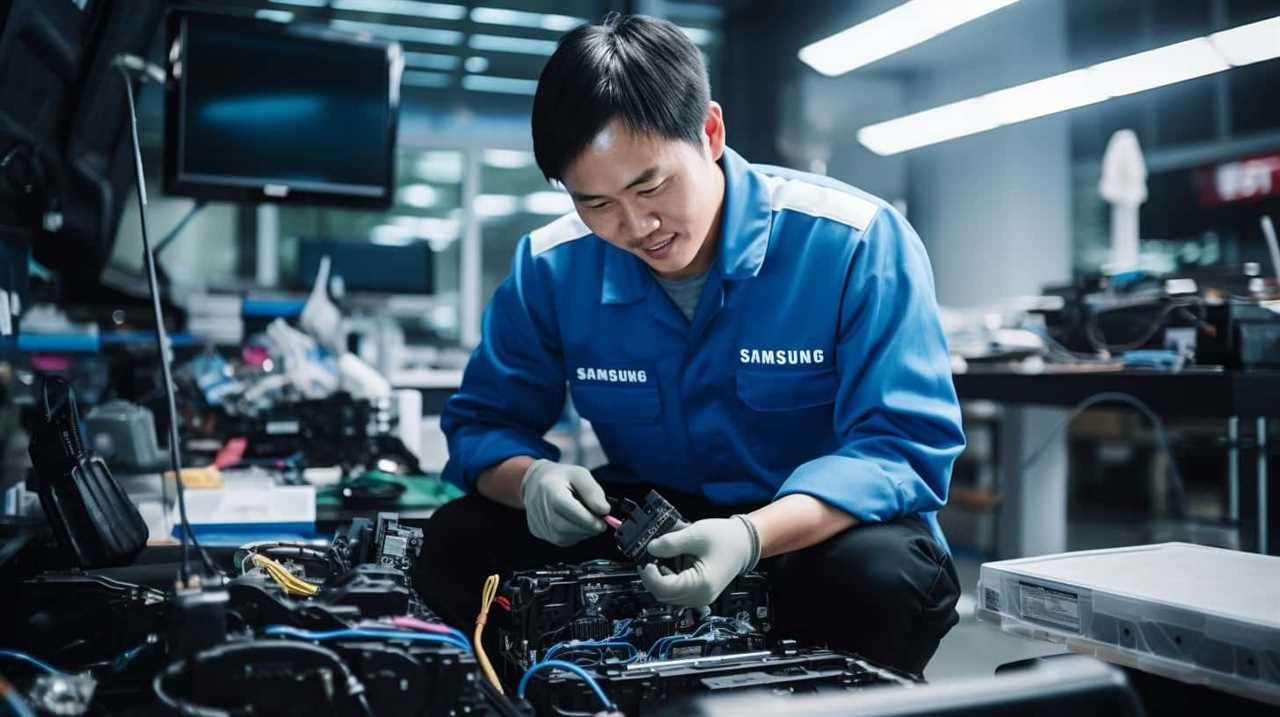Are you aware that performing routine maintenance can increase your dishwasher’s lifespan by as much as 50%?
In this article, we’ll share our top 5 pro tips for keeping your dishwasher in tiptop shape.
From proper loading techniques to effective use of detergents, we’ve got you covered.
Maintaining your dishwasher not only ensures its optimal performance but also saves you money on repairs and replacements.

So, let’s dive into these expert tips and learn how to keep our dishwashers running smoothly for years to come.
Key Takeaways
- Regular cleaning and maintenance of the dishwasher can extend its lifespan by up to 50%.
- Proper loading and stacking techniques help prevent breakage and ensure effective cleaning and draining.
- Using eco-friendly detergents and following manufacturer’s instructions optimize cleaning results.
- Checking and cleaning the filters regularly prevent poor cleaning performance, water drainage issues, and odors.
Regular Cleaning and Maintenance
To ensure optimal performance and longevity, regular cleaning and maintenance should be performed on your dishwasher. By taking preventive measures and troubleshooting common issues, you can keep your dishwasher running smoothly for years to come.
One of the most important preventive measures is to clean the dishwasher filter regularly. Over time, the filter can become clogged with food particles and debris, which can affect the dishwasher’s performance. Remove the filter and rinse it under running water to remove any buildup. Additionally, check the spray arm nozzles for blockages and use a toothpick or a small brush to clear any obstructions.
Another common issue with dishwashers is a buildup of limescale and mineral deposits. These deposits can affect the efficiency of the dishwasher and leave spots on your dishes. To prevent this, regularly run a cycle with a dishwasher cleaner or a mixture of vinegar and baking soda. This will help remove any buildup and keep your dishwasher functioning at its best.

In conclusion, regular cleaning and maintenance are crucial for the optimal performance and longevity of your dishwasher. By taking preventive measures and troubleshooting common issues, you can ensure that your dishwasher continues to work efficiently.
Now, let’s move on to the next section and discuss proper loading and stacking techniques.
Proper Loading and Stacking Techniques
When loading and stacking dishes in the dishwasher, we recommend using a gentle, upward motion to prevent any breakage or damage. Proper loading and stacking techniques are essential for maximizing capacity and preventing damage to your dishwasher and dishes.
To maximize capacity, arrange the dishes in a way that allows for even water distribution and efficient cleaning. Start by placing larger items such as plates and serving dishes in the bottom rack, ensuring they’re evenly spaced and facing towards the center. Next, load smaller items like glasses, cups, and bowls securely in the top rack, facing downwards to allow for proper cleaning and draining.

To prevent damage, avoid overcrowding the dishwasher and ensure that no items are blocking the spray arms or obstructing the detergent dispenser. Additionally, be mindful of sharp utensils or items with delicate patterns that may require handwashing.
By following these proper loading and stacking techniques, you can maximize the capacity of your dishwasher and prevent damage to your dishes and appliance.
Now, let’s move on to the next section about the effective use of dishwasher detergents.
Effective Use of Dishwasher Detergents
Now let’s dive into how we can effectively use dishwasher detergents to ensure optimal cleaning performance.

Here are four pro tips for choosing eco-friendly detergents and troubleshooting common detergent issues:
- Choose eco-friendly detergents: When selecting a dishwasher detergent, opt for eco-friendly options that are free from phosphates, chlorine, and other harmful chemicals. Look for labels that indicate biodegradability and environmental certifications to minimize your impact on the planet.
- Follow manufacturer’s instructions: Read the instructions provided by the dishwasher manufacturer and the detergent packaging carefully. Different dishwashers may require specific amounts of detergent for optimal cleaning. Using more detergent than recommended can lead to excessive sudsing or residue on dishes.
- Pre-rinse properly: While it may seem counterintuitive, pre-rinsing dishes can actually hinder the cleaning process. Modern dishwashers are designed to remove food particles effectively, so only scrape off large food scraps before loading. Excessive pre-rinsing can lead to insufficient sudsing and poor cleaning results.
- Troubleshoot common detergent issues: If you’re experiencing problems like streaks, spots, or cloudy glassware, try adjusting the detergent amount and water temperature. Hard water can also affect detergent performance, so consider using a rinse aid or water softener to improve results.
Checking and Cleaning the Filters
Let’s now take a look at how we can ensure optimal dishwasher performance by regularly checking and cleaning the filters.
The filters in a dishwasher play a crucial role in preventing food particles and debris from clogging the spray arms and other components. By keeping the filters clean, you can ensure that your dishwasher operates at its best.
To begin the cleaning process, locate the filters in your dishwasher. The location of the filters may vary depending on the model, but they’re usually found at the bottom of the dishwasher, near the spray arms. Remove the filters carefully and rinse them under running water to remove any loose debris.

For a deeper clean, soak the filters in warm, soapy water for about 15 minutes. Gently scrub them with a soft brush to remove any stubborn residue. Rinse the filters thoroughly and ensure that there are no remaining particles before reinstalling them.
Regularly checking and cleaning the filters can also help troubleshoot common dishwasher problems. Clogged filters can lead to poor cleaning performance, water drainage issues, and unpleasant odors. By maintaining clean filters, you can prevent these problems and keep your dishwasher running smoothly.
Remember to consult your dishwasher’s user manual for specific instructions on how to remove, clean, and reinstall the filters. Following these troubleshooting tips will help maximize the lifespan of your dishwasher and ensure sparkling clean dishes every time.
Inspecting and Maintaining the Spray Arms
To ensure optimal dishwasher performance, we regularly inspect and maintain the spray arms. The spray arms in a dishwasher play a crucial role in distributing water and detergent evenly throughout the dishwasher. Neglecting their maintenance can lead to poor cleaning results and even damage to other components.

Here are some essential tips for inspecting and maintaining the spray arms:
- Check for blockages: Inspect the spray arms for any debris or clogs that may be obstructing the spray holes. Use a toothpick or a small brush to remove any residue that might affect the spray pattern.
- Ensure proper alignment: Make sure the spray arms are properly aligned and securely fastened to the dishwasher’s interior. Misaligned spray arms can result in uneven water distribution and inefficient cleaning.
- Monitor wear and tear: Regularly check the spray arms for signs of wear and tear, such as loose or damaged spray nozzles. If any damage is detected, consider a spray arm replacement to maintain optimal performance.
- Troubleshoot spray arm issues: If the spray arms aren’t rotating or spraying properly, there may be an issue with the water supply, pump, or motor. Consult the dishwasher’s user manual or contact a professional technician for troubleshooting assistance.
Frequently Asked Questions
How Can I Prevent My Dishwasher From Developing a Foul Odor?
To prevent our dishwasher from developing a foul odor, we can try some effective solutions and natural remedies.
One common problem is food residue buildup, which can cause the odor. By regularly cleaning the filter, removing any debris, and using a vinegar or baking soda rinse, we can eliminate the odor-causing bacteria.
Additionally, ensuring that the dishwasher is properly sealed and running hot water cycles will also help in preventing the foul smell.

Should I Pre-Rinse My Dishes Before Loading Them Into the Dishwasher?
Pre-rinsing your dishes before loading them into the dishwasher can have benefits. It helps remove excess food particles and prevent clogs in the dishwasher’s drain.
However, there are alternative loading techniques that can minimize the need for pre-rinsing. By scraping off large food debris and using the dishwasher’s built-in food disposal system, you can reduce the amount of pre-rinsing required.
This saves time and water while still achieving clean dishes.
Can I Use Regular Dish Soap Instead of Dishwasher Detergent?
Using regular dish soap in a dishwasher can cause damage to the machine and result in poor cleaning performance. It’s important to use dishwasher detergent specifically formulated for use in dishwashers.

Regular dish soap creates excessive suds that can overflow and clog the dishwasher, leading to costly repairs. Additionally, regular dish soap doesn’t contain the enzymes and chemicals necessary to effectively break down food particles and grease.
Stick to using regular dish soap for handwashing dishes and explore alternative uses for it in the kitchen.
How Often Should I Clean the Filters in My Dishwasher?
We should clean the filters in our dishwasher regularly to maintain its efficiency.
Hard water stains can build up over time and affect the performance of our dishwasher.

To remove these stains, we can use a mixture of vinegar and water or a dishwasher cleaner specifically designed for hard water stains.
It’s recommended to clean the filters at least once a month to ensure optimal performance and prevent any clogs or blockages.
What Should I Do if I Notice That the Spray Arms Are Not Spinning Properly?
When the spray arms aren’t spinning properly, it can be quite frustrating. But fear not, we’ve got some tips to help you troubleshoot and fix this issue.
First, check for any clogs or debris in the spray arm holes and clean them out.

Next, make sure the spray arm is properly attached and isn’t loose.
If it still isn’t spinning, you may need to replace the spray arm or call a professional for further assistance.
Conclusion
In conclusion, by following these top 5 pro tips for dishwasher maintenance, you can ensure that your dishwasher remains in good working condition and continues to provide you with clean and spotless dishes.
Regular cleaning, proper loading techniques, effective use of detergents, checking and cleaning the filters, and inspecting and maintaining the spray arms are all essential for keeping your dishwasher running smoothly.

Take care of your dishwasher, and it will take care of your dishes.









